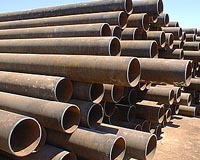| . |  |
. |
Beijing (AFP) Oct 11, 2009 China wants to expand its global media presence to reflect its burgeoning influence on the international stage, and has tapped a few major groups with massive financial backing for the job. In a symbol of this new Chinese ambition, President Hu Jintao personally opened last week's inaugural World Media Summit, organised by the state Xinhua news agency, bringing together executives from 170 media outlets. In the massive formal reception rooms of the Great Hall of the People on Beijing's Tiananmen Square, foreign delegates applauded as Hu offered a vision of a "true, correct, comprehensive and objective communication of information". To the right of Hu -- who is also general secretary of the ruling Communist Party, which strictly controls the media here -- sat Rupert Murdoch, who embodies this new Chinese dream with his worldwide media investments. Murdoch's News Corporation, the Associated Press, Reuters, the BBC, Russia's ITAR-TASS, Japan's Kyodo agency, Turner Broadcasting System (TBS) and Google agreed to co-host the so-called "Media Olympics" -- organised at great expense by Beijing. Agence France-Presse (AFP) participated in the debates, most of which related to the challenges of reporting in a digital and multimedia age. Stung by several high-profile public relations disasters last year, including the chaotic Olympic torch relay, Beijing has tasked two or three signature media groups with projecting the image of a powerful China abroad. It has earmarked 45 billion yuan (6.5 billion dollars) to fund the expansion of groups including Xinhua, state television CCTV and CRI radio, according to Hong Kong media -- at a time when the industry is facing a major money crunch elsewhere. Xinhua -- which is planning to add to its 117 bureaux around the world, which report in eight languages -- would like to join the tight circle of international news agencies. "We are in a restructuring phase -- we've just opened a multimedia desk," Xinhua president Li Congjun told AFP. The agency has opened a video service and is starting to offer mobile applications. CCTV just launched an Arabic-language channel, reaching 300 million people in 22 countries, and is gearing up to start a Russian service. CRI, which already broadcasts in 43 languages, is also expanding its presence abroad. China also wants to set up media and entertainment conglomerates similar to News Corporation or Time Warner, that would have some private funding. "As China moves from a domestic-oriented participant to an international industry leader, it will grow its own Time Warner," said Steve Marcopoto, president and managing director of TBS Asia Pacific Ltd, part of the Time Warner group. Murdoch said he was "genuinely looking forward to that competition" from China, but also railed against the "lack of intellectual property protection domestically" and what he called "content kleptomaniacs". "There are interesting media companies emerging in China but piracy will make it difficult for them to generate the profits at home that would fuel growth abroad," he warned. He also told summit participants that the groups were "not exposed to the competition that would prepare them for the rigours of the global marketplace," calling on China to open the "digital door" of its media market. China has the world's largest number of Internet users at 338 million, according to official figures -- more than the whole US population -- and the largest mobile phone market at 710 million. Freedom of information, a vital theme to address in a country where the press is subject to tight restrictions, was neither part of the World Media Summit agenda nor was it raised by participants so as not to offend the host. Clive Marshall, chief executive of the Australian Associated Press, was a notable exception. "There must be no compromise on the quality of news and no censorship of the news," he said as he summarised a roundtable discussion on behalf of all its participants. As for next year, China suffered a setback -- none of the co-hosting foreign groups offered to put on a similar event next year. Share This Article With Planet Earth
Related Links Global Trade News
 US mulls import penalties on Chinese steel pipes
US mulls import penalties on Chinese steel pipesWashington (AFP) Oct 7, 2009 The United States launched a probe Wednesday to consider slapping almost 100 percent tariffs on imported steel pipes from China in a move that could widen a trade spat between the two key powers. Washington has decided to "initiate antidumping and countervailing duty investigations on imports" of Chinese "seamless" pipes used to convey water, steam, chemicals, oil products and natural gas ... read more |
|
| The content herein, unless otherwise known to be public domain, are Copyright 1995-2009 - SpaceDaily. AFP and UPI Wire Stories are copyright Agence France-Presse and United Press International. ESA Portal Reports are copyright European Space Agency. All NASA sourced material is public domain. Additional copyrights may apply in whole or part to other bona fide parties. Advertising does not imply endorsement,agreement or approval of any opinions, statements or information provided by SpaceDaily on any Web page published or hosted by SpaceDaily. Privacy Statement |